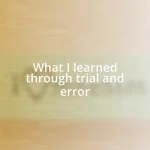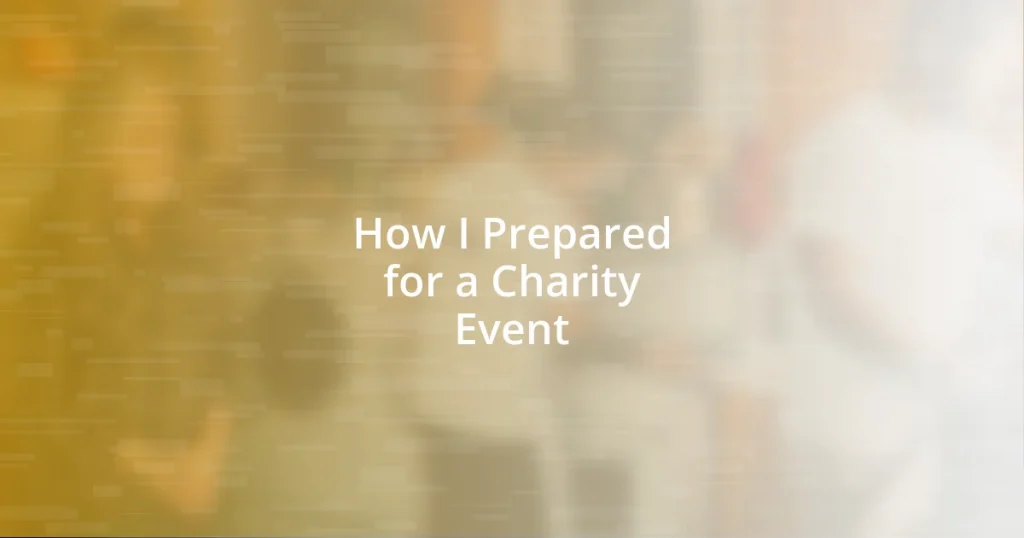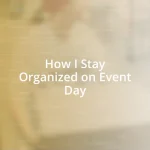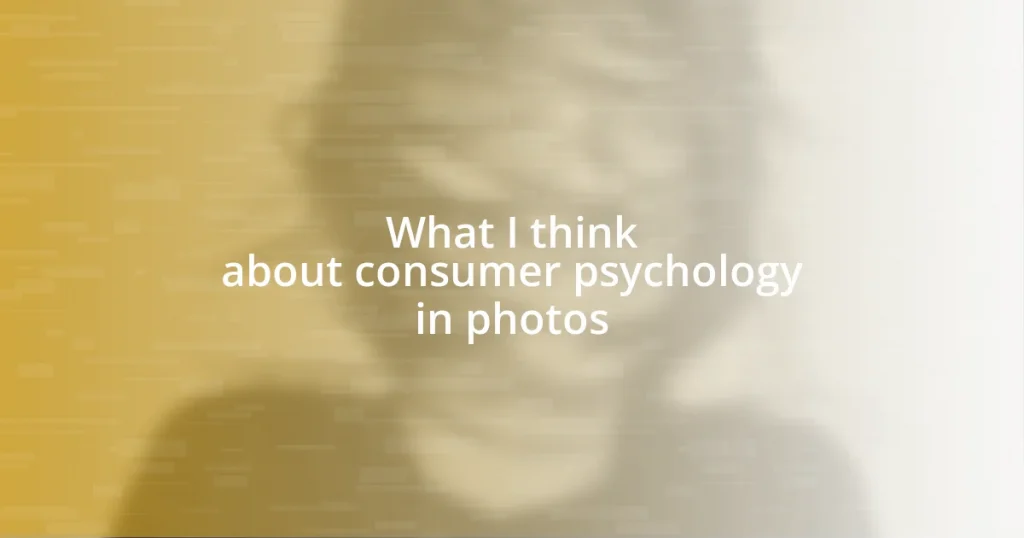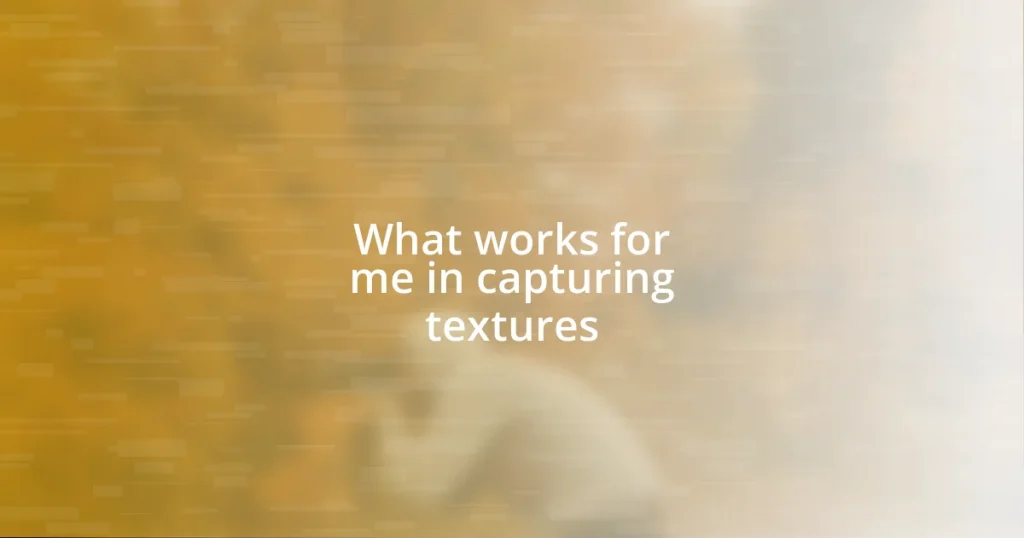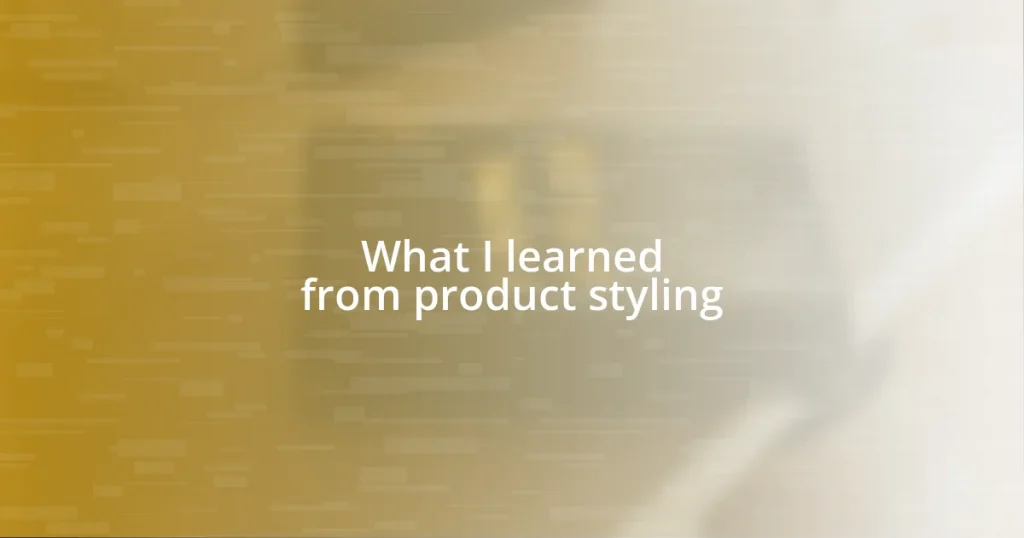Key takeaways:
- Choosing a charity event that aligns with personal values and community needs enhances motivation and commitment.
- Setting clear, measurable goals for fundraising fosters accountability and helps track progress effectively.
- Engaging volunteers through personal connections, recognition, and community building boosts morale and participation.

Choosing the Right Charity Event
Choosing the right charity event can feel daunting, but it’s essential to find a cause that resonates with you. I remember when I was selecting a charity run to participate in; I chose one that supported mental health awareness because I’ve seen firsthand how impactful it can be. Can you recall a cause that has touched your heart or changed your perspective? That connection makes all the difference in motivation and commitment.
As I dove deeper into my options, I looked for events that aligned not just with my passions but also with my values. For instance, I once opted for a local food drive because it was community-focused, and I believed my contributions could truly make an immediate difference. Have you thought about how your local community’s needs could influence your choice? The closer the connection, the more fulfilling the experience often is.
It’s also crucial to consider the event’s goals and potential impact. I remember feeling inspired by a charity gala that aimed to fund scholarships for underprivileged students. When I learned about the tangible outcomes of their efforts, like helping kids pursue their dreams, I couldn’t help but feel a sense of pride in being part of it. What kind of impact would motivate you to get involved? Connecting these dots can ignite your passion and lead to meaningful participation.

Setting Clear Goals for Fundraising
Setting clear goals for fundraising is crucial to ensure that your efforts yield meaningful results. I vividly recall my first charity event, where I aimed to raise $1,000 for a local shelter. Having a specific target not only gave me direction but also helped me focus my energy on strategies that would get me there, like hosting a fundraising dinner. What kind of objectives do you think would drive your efforts?
Establishing measurable goals can enhance accountability. For example, I learned that setting smaller milestones, like raising $250 each week, allowed me to celebrate small wins along the way. These little victories kept my motivation high and created a supportive environment among my friends who were helping me. Is there a method you could use to track your progress?
Finally, aligning your goals with the charity’s mission adds depth to your fundraising efforts. I found it deeply satisfying to work toward a cause that not only resonated with me but also had clear outcomes, like feeding families in need. Knowing that every dollar brought us closer to that mission made the entire experience feel purposeful. How would such an alignment affect your fundraising journey?
| Goal Type | Description |
|---|---|
| Specific Goals | Clearly defined targets that provide direction. |
| Measurable Goals | Utilizing metrics to track fundraising progress. |
| Aligned Goals | Goals that reflect both personal values and the charity’s mission. |

Creating a Comprehensive Action Plan
Creating a comprehensive action plan is one of the most essential steps I took when preparing for my charity event. I remember sitting down one evening with a cup of tea and mapping out every detail. It felt akin to crafting a treasure map—each step brought me closer to my goal. By breaking down the preparation into smaller, manageable tasks, I created a sense of clarity that I hadn’t anticipated. It transformed a potentially overwhelming process into an exciting adventure. Here’s what I focused on:
- Event Timeline: Establish key dates for promotion, logistics, and fundraising milestones.
- Task Delegation: Assign specific responsibilities to team members based on their strengths.
- Budget Planning: Create a detailed budget to manage expenses and maximize funds raised.
Additionally, I learned that flexibility is vital when managing your action plan. There were moments when unexpected challenges arose, like a last-minute venue change. Instead of panicking, I used my plan as a guide. Adjusting my actions accordingly not only kept me organized but also enhanced my problem-solving skills. I found that the ability to pivot enabled me to maintain momentum, even when faced with hurdles.
- Contingency Plans: Identify potential issues and brainstorm alternate solutions.
- Regular Check-ins: Schedule touchpoints with the team to assess progress and adjust tasks.
- Feedback Mechanism: Establish a system for gathering input from participants to improve future events.
It was this blend of structure and adaptability that made my action plan both comprehensive and effective. As I tackled each task, I could see the event taking shape, and knowing I had a solid plan gave me confidence. What about you? Have you ever crafted an action plan that helped you navigate a complex project? The right preparation can truly make all the difference.

Engaging Volunteers for Support
Engaging volunteers effectively is essential to creating a successful charity event. I discovered that tapping into people’s passions is a surefire way to ignite their motivation. For instance, when I reached out to friends, I personalized each request by highlighting the cause’s significance to them. This connection transformed their enthusiasm, making them feel like valued contributors rather than just helpers. Have you considered how the cause could resonate uniquely with each volunteer?
In my experience, building a sense of community among volunteers fosters commitment. I once organized a meet-and-greet where we shared personal stories about our connections to the charity. This openness not only strengthened our bonds but also turned a group of strangers into a tight-knit team. When volunteers feel emotionally invested, they’re more likely to contribute their time and energy wholeheartedly. What strategies could you use to cultivate this sense of belonging?
Lastly, I’ve learned that recognizing and celebrating volunteers’ efforts, no matter how small, can significantly boost morale. During my events, I made it a point to highlight individual contributions in our meetings and send out thank-you notes with personal messages. These gestures made volunteers feel appreciated and valued, and it encouraged them to stay engaged for future events. What recognition methods do you think would resonate with your volunteers?
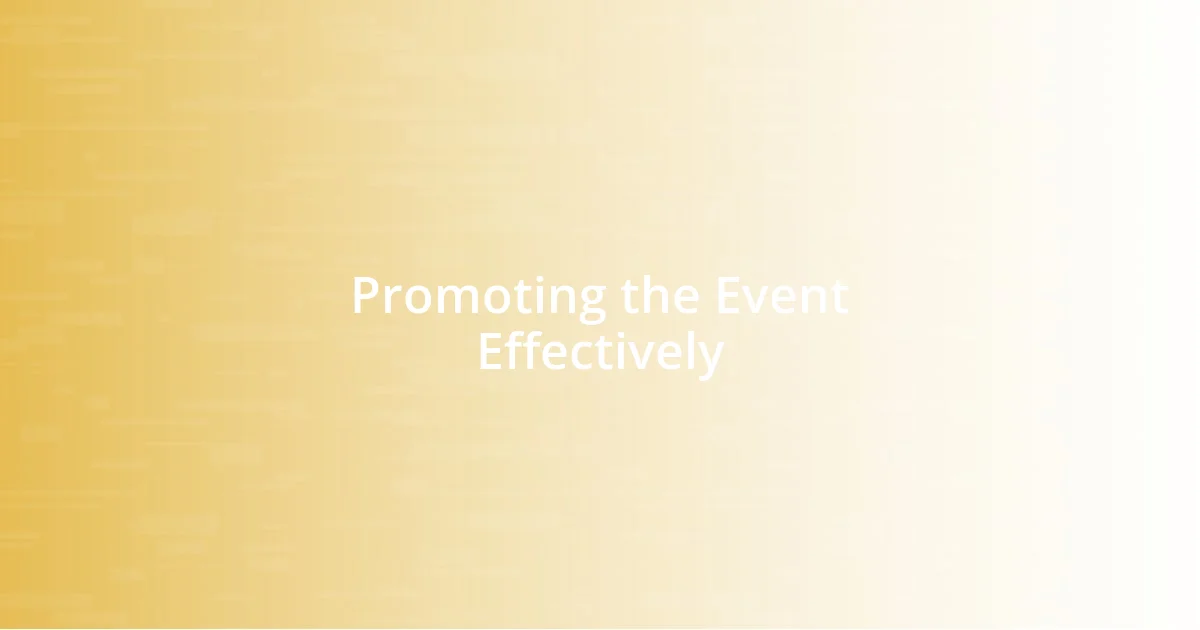
Promoting the Event Effectively
Promoting a charity event effectively is a game-changer in ensuring its success. I vividly remember the excitement I felt while crafting social media posts that captured the essence of our cause. One particularly memorable post featured a heartfelt story from a beneficiary, which sparked an emotional connection. I found that using relatable, genuine content could inspire others to share our mission, amplifying our reach beyond my immediate circle. How do you think storytelling affects engagement in your promotional efforts?
In addition to personal stories, I relied heavily on creating visually appealing graphics that communicated key information at a glance. By using a consistent color scheme and including eye-catching images, we generated buzz and anticipation. I was amazed at how a simple flyer shared online could turn into discussions among friends, multiplying our event’s visibility. What design strategies do you think would resonate best with your audience?
Leveraging local partnerships also played a significant role in boosting our promotional efforts. I reached out to local businesses, and many were more than willing to collaborate, whether through sponsorship or by sharing our event details with their customers. Establishing those connections not only broadened our audience but also created a sense of community. I learned that when everyone pitches in, the impact can be monumental. Have you ever considered how local allies could strengthen your event promotion?

Preparing for Event Day Logistics
When preparing for event day logistics, I always take the time to create a detailed checklist that outlines every task and responsibility. For my last charity event, I mapped out everything from set-up times to equipment rentals. This step kept me organized and allowed me to anticipate any potential hiccups. Have you ever found that breaking down tasks makes the whole process less daunting?
In addition to the checklist, I ensured that volunteers knew their roles well in advance. I held a logistics briefing the week before to go over responsibilities and answer any questions. I noticed that when everyone was clear about what to do, it significantly reduced stress on the event day. How do you prepare your team to ensure they’re confident and ready to contribute?
Finally, I always double-check all logistics the day before the event. On one occasion, I nearly forgot to confirm our catering order, which could have derailed everything. Thankfully, a teammate reminded me, and we managed to get it sorted out just in time. Have you ever had a last-minute scramble that taught you the importance of thorough preparation?

Evaluating Event Success and Impact
Evaluating the success and impact of a charity event goes beyond just counting the funds raised. After my last event, I gathered my team to reflect on what worked and what didn’t. I found that discussing our experiences opened up a dialogue about emotional connections formed during the event, which often hold as much value as the financial figures. How do you measure the impact of an event beyond what’s seen on the spreadsheets?
Surveys and feedback from attendees can be incredibly revealing. I remember sending out a post-event survey and receiving heartfelt responses that detailed how our cause resonated with individuals. One attendee shared that they felt a newfound sense of community, which truly warmed my heart. It made me realize that our event created not just donations, but connections that could last well beyond a single day. Have you ever considered how qualitative feedback can shape future events?
Lastly, I’ve learned the importance of tracking metrics over time. I often look back at previous events to see trends and areas for improvement. For instance, while sponsorships increased, ticket sales fluctuated; this insight helped me tweak our strategies for subsequent events. Reflecting on past accomplishments and failures gives valuable perspective on how to evolve our approach. What insights have your events offered you that have shaped future planning?




